Real Estate Attorney Resume Examples

Jul 18, 2024
|
12 min read
Nail your next job with our guide on how to write a real estate attorney resume, complete with tips that will make you outshine all your competition and "seal the deal" on your dream job.
Rated by 348 people
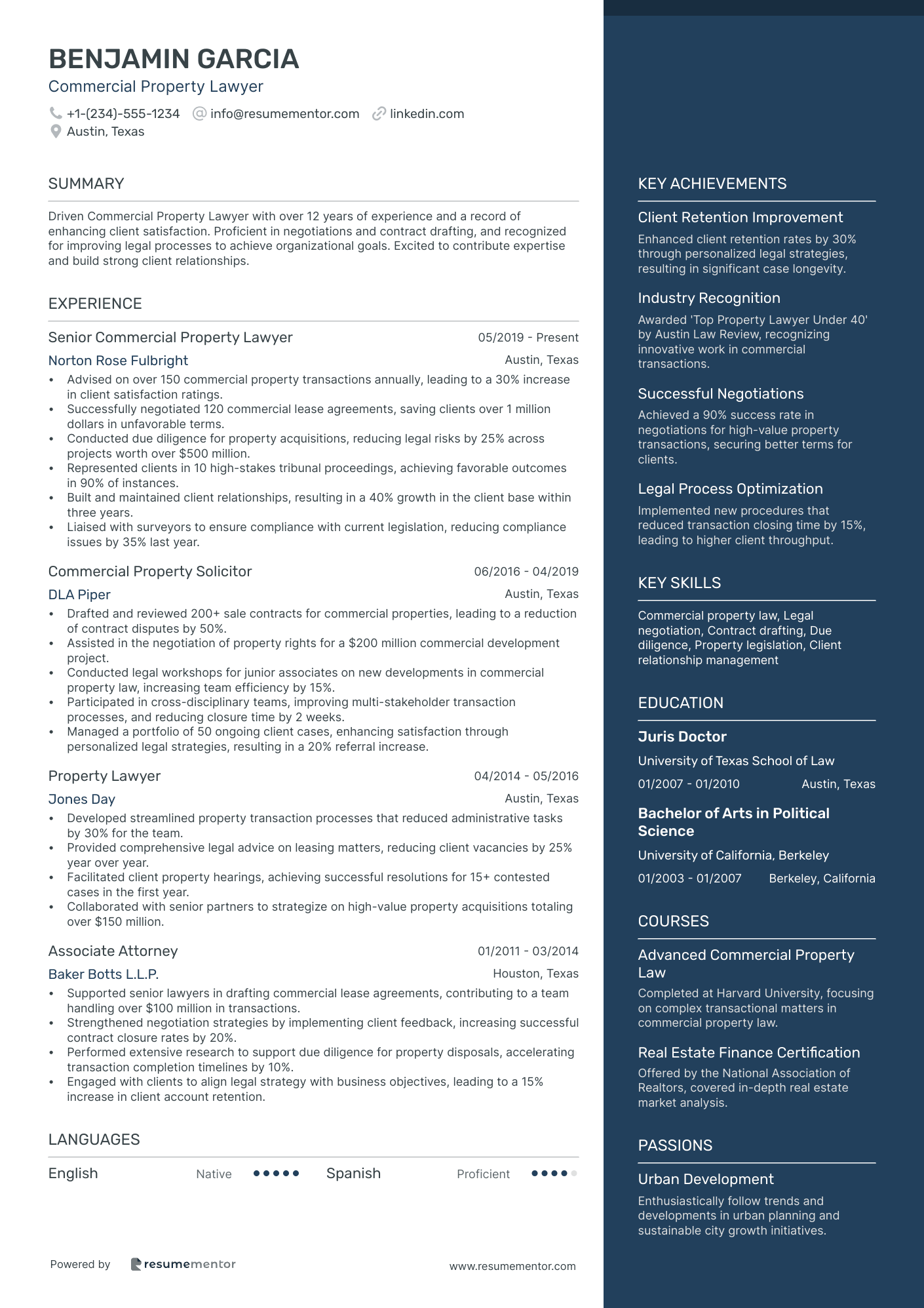
Commercial Property Lawyer
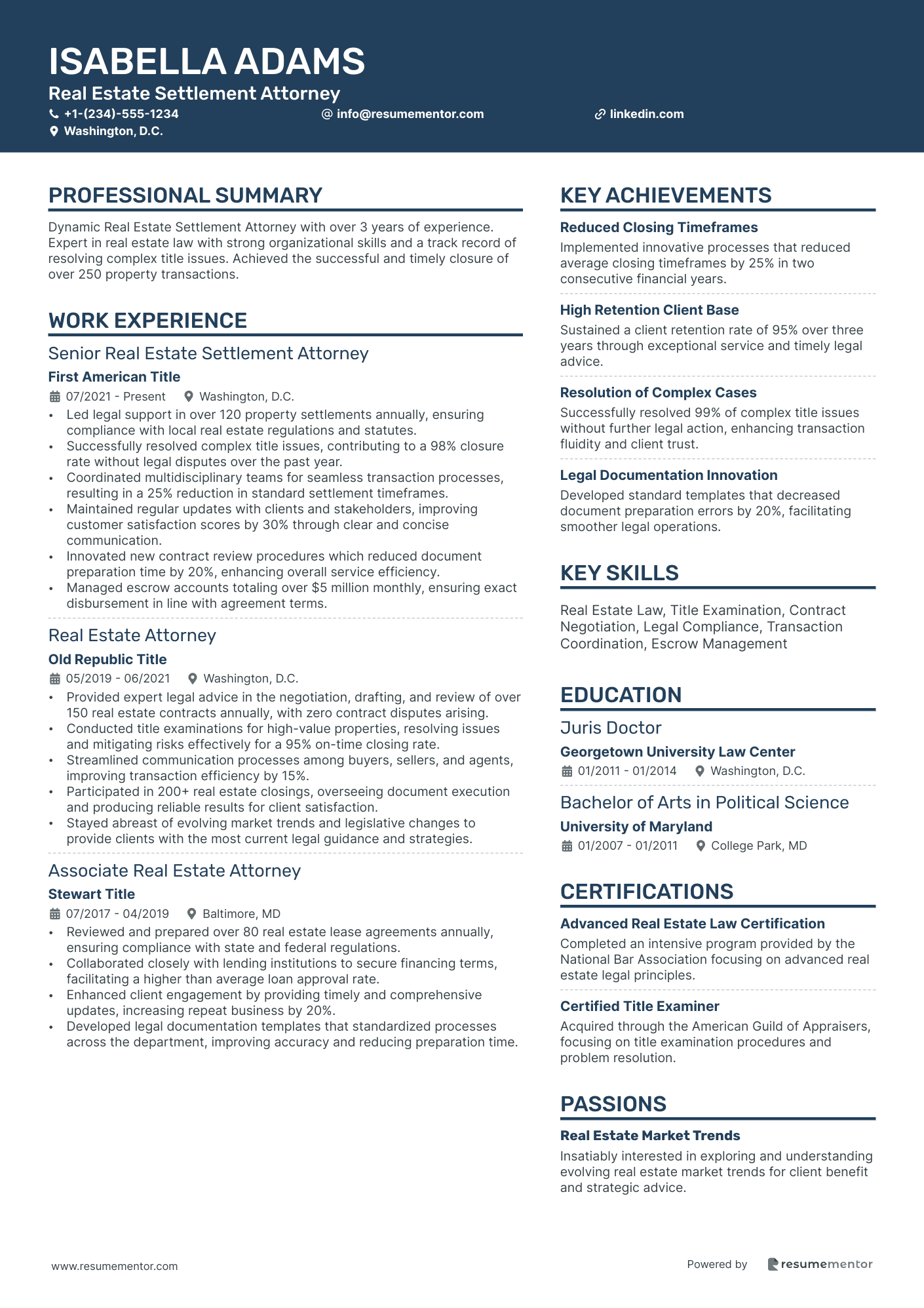
Real Estate Settlement Attorney
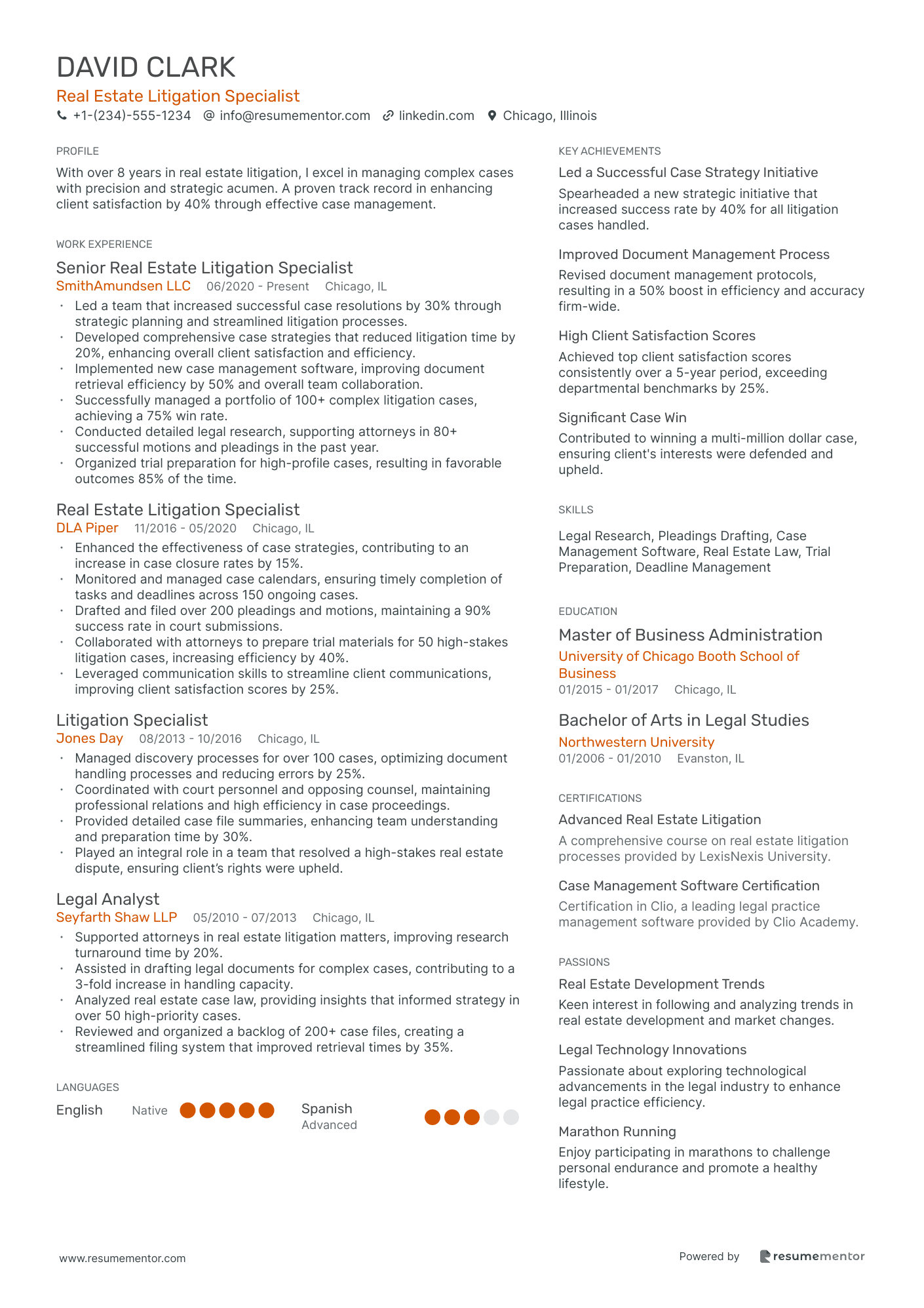
Real Estate Litigation Specialist
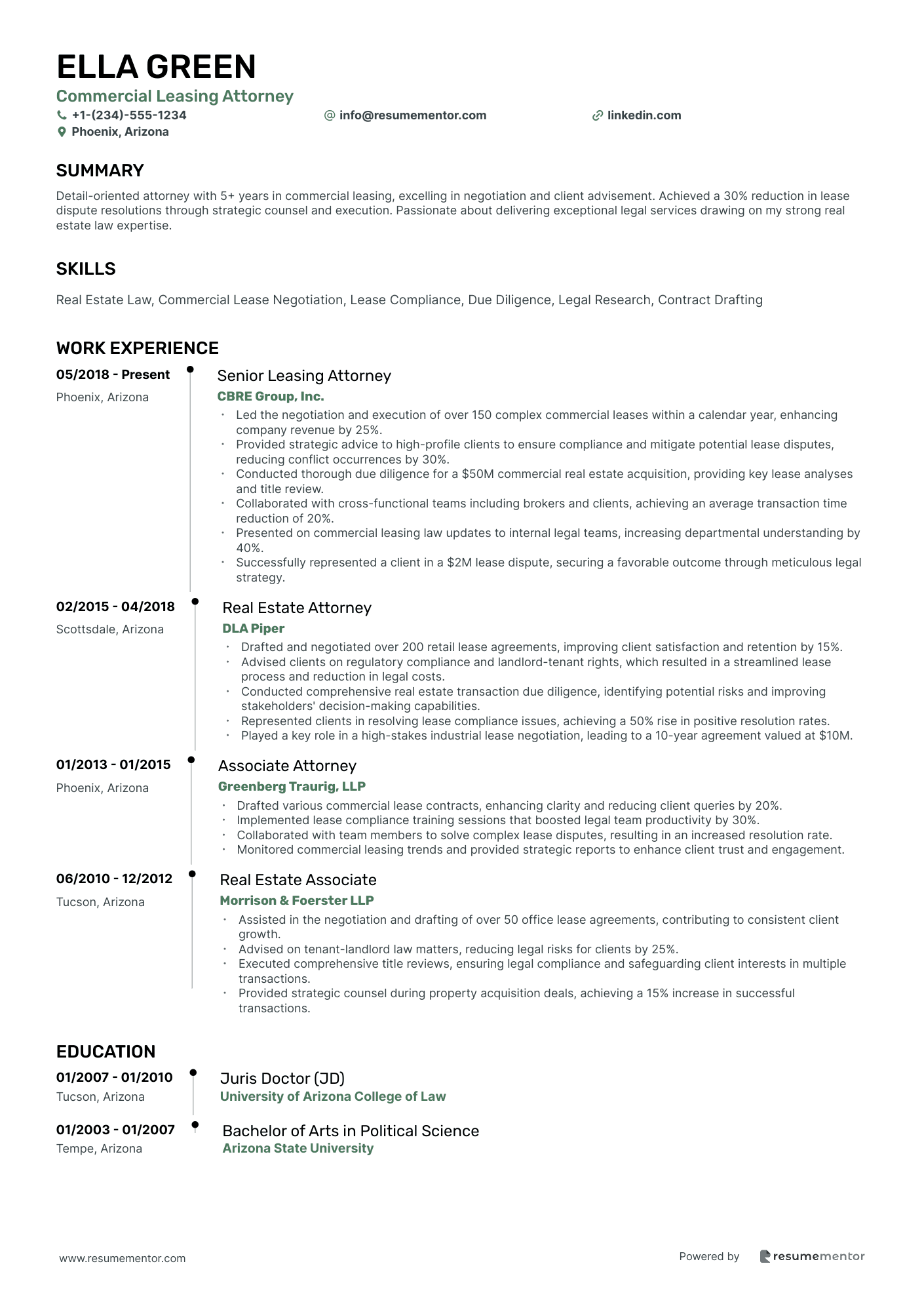
Commercial Leasing Attorney
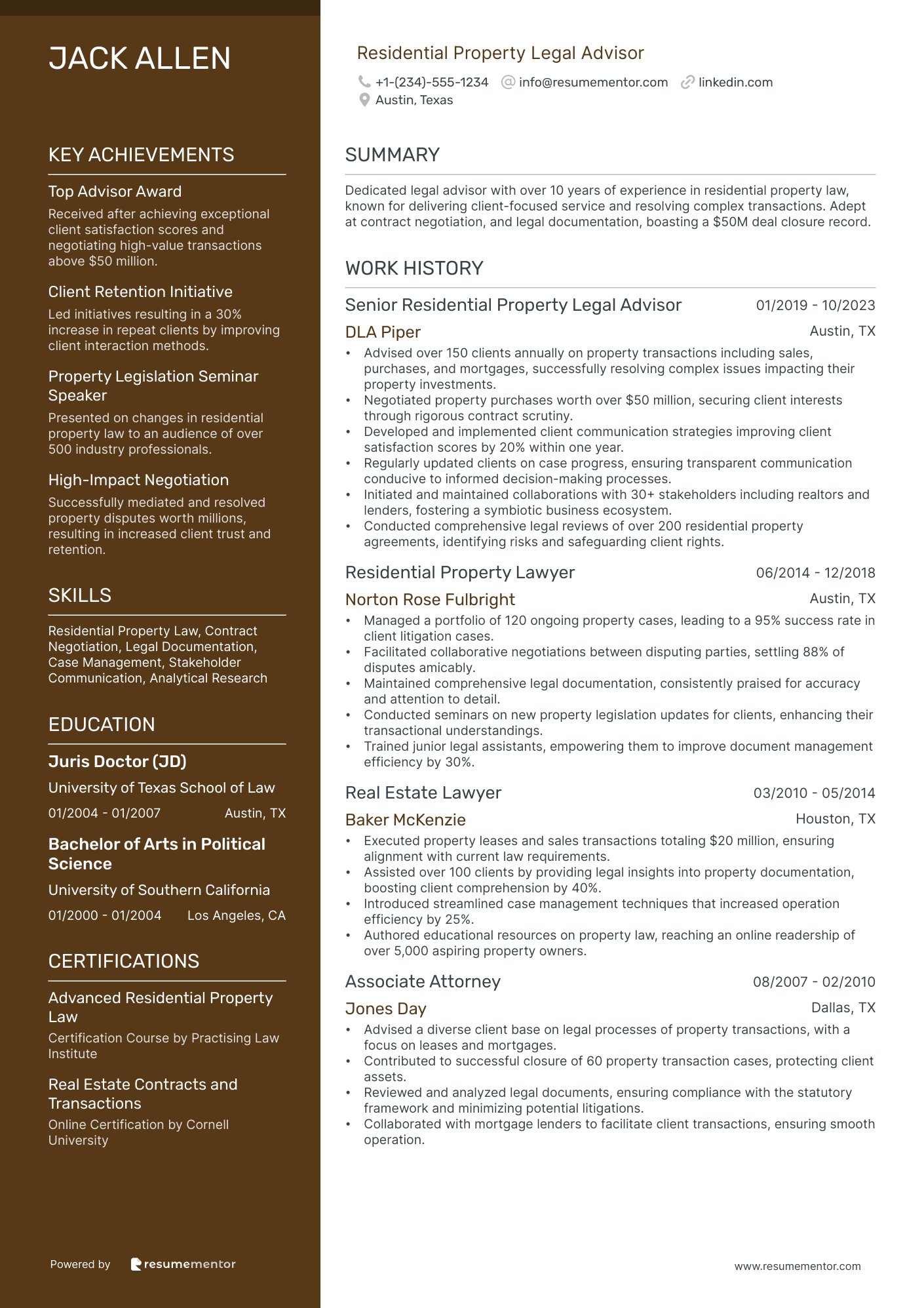
Residential Property Legal Advisor
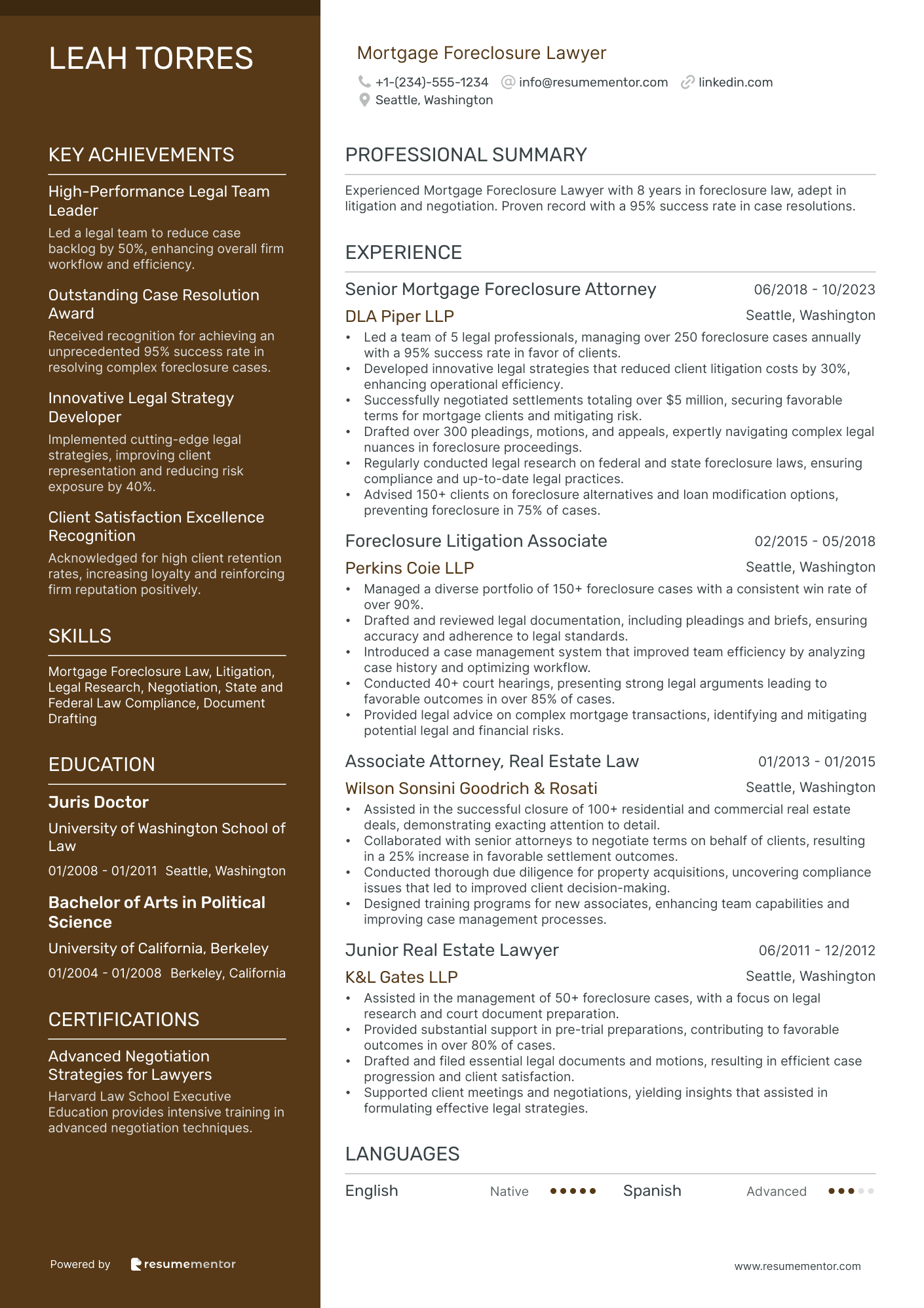
Mortgage Foreclosure Lawyer
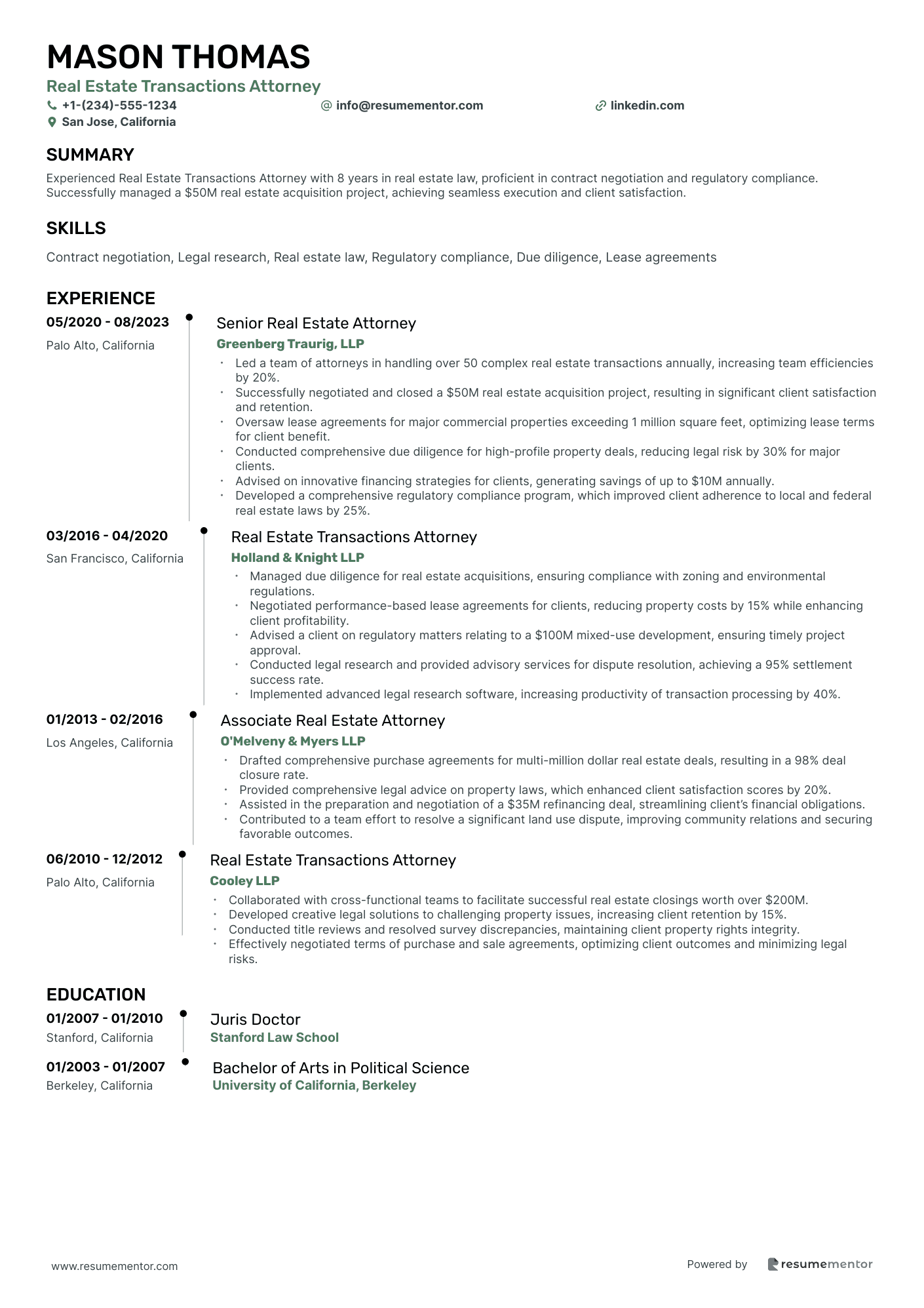
Real Estate Transactions Attorney
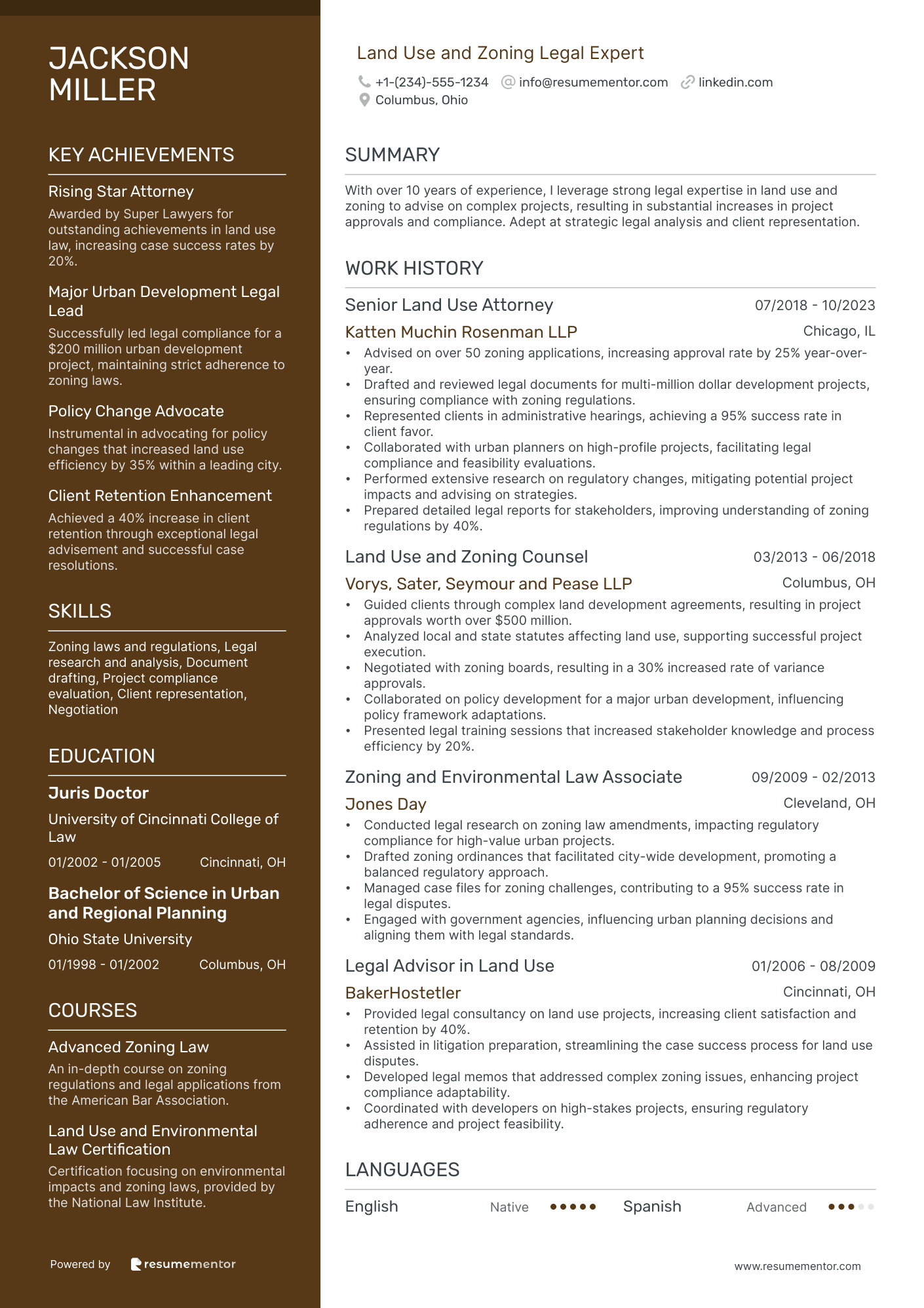
Land Use and Zoning Legal Expert
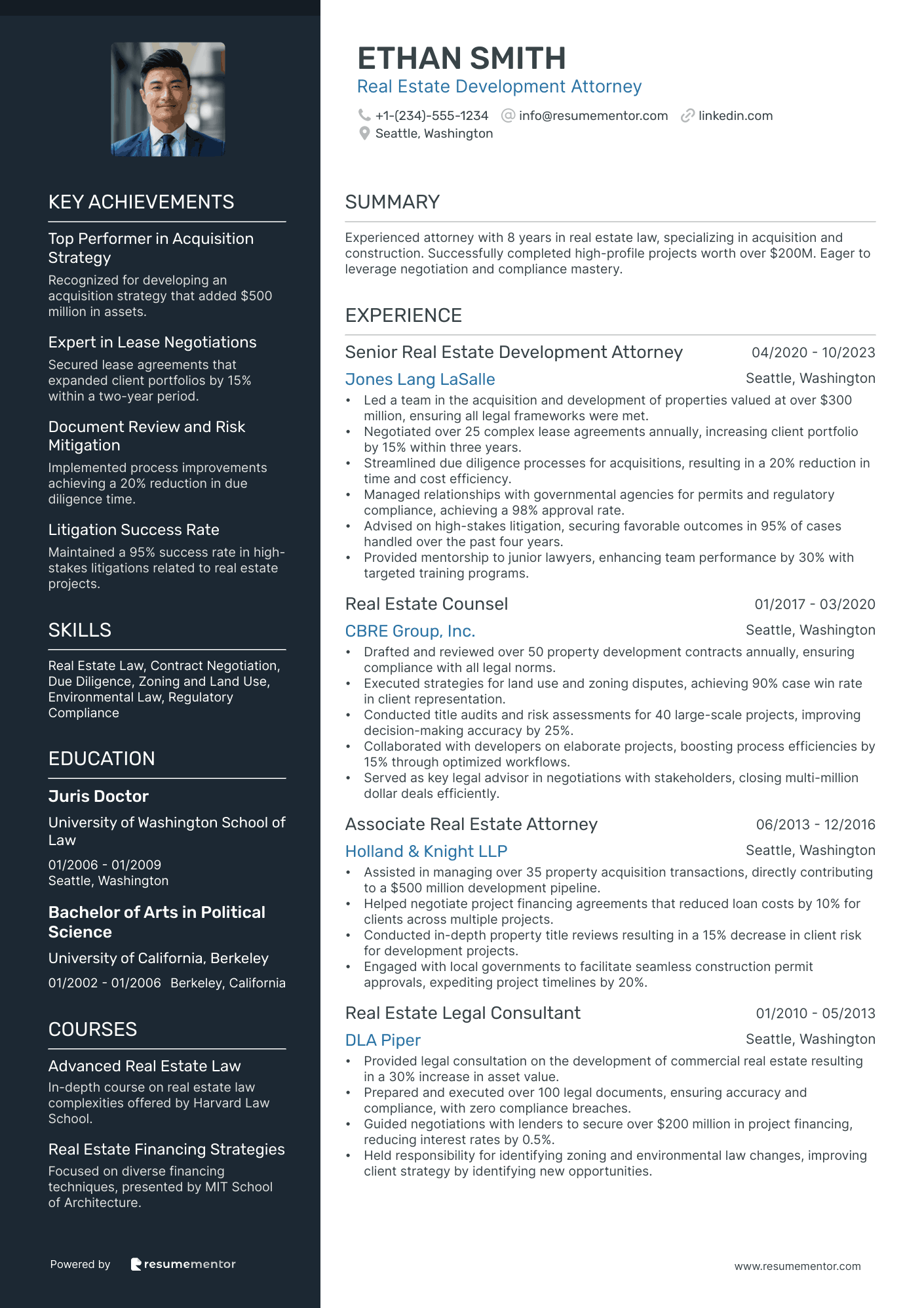
Real Estate Development Attorney
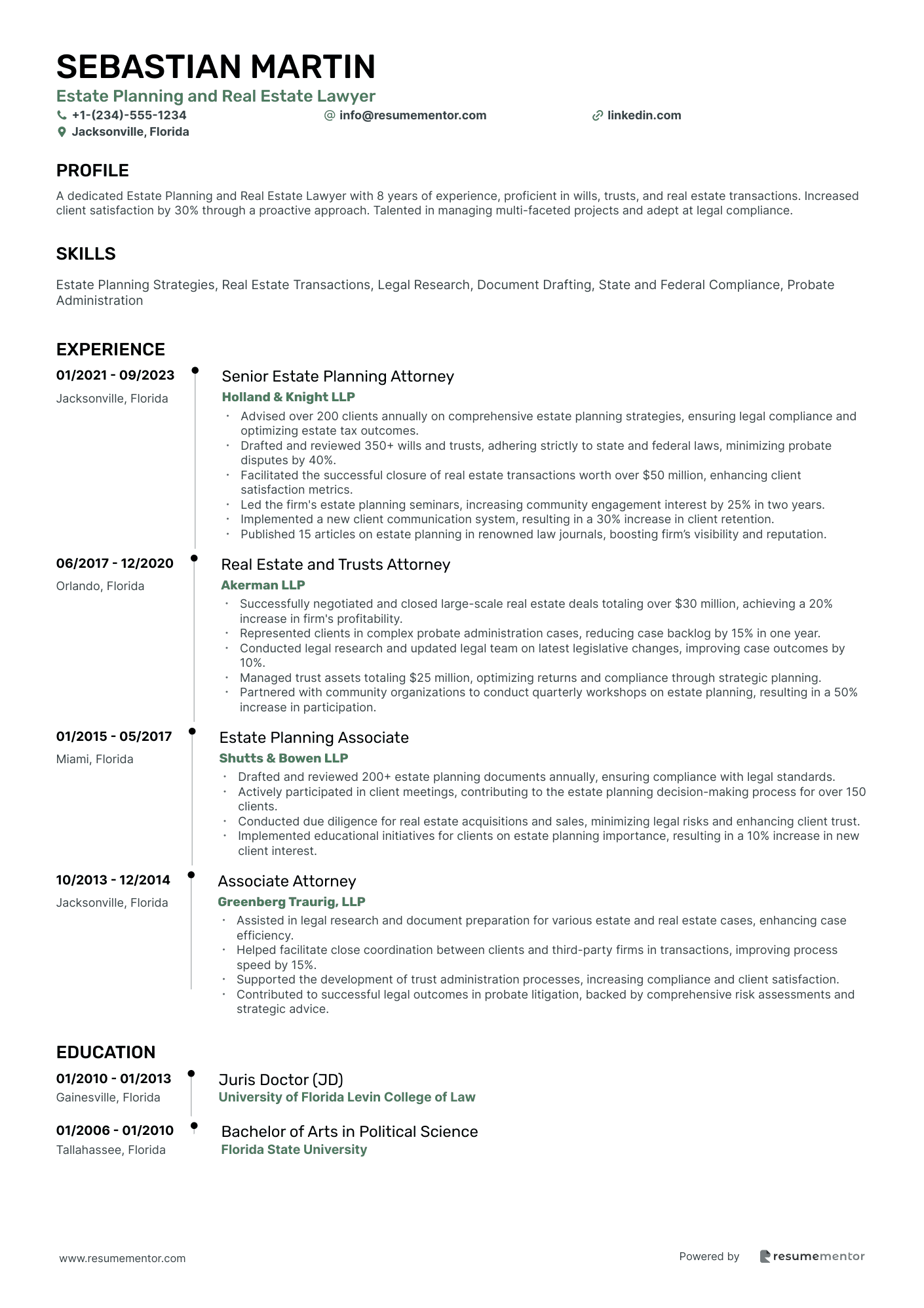
Estate Planning and Real Estate Lawyer

Commercial Property Lawyer resume sample
- •Advised on over 150 commercial property transactions annually, leading to a 30% increase in client satisfaction ratings.
- •Successfully negotiated 120 commercial lease agreements, saving clients over 1 million dollars in unfavorable terms.
- •Conducted due diligence for property acquisitions, reducing legal risks by 25% across projects worth over $500 million.
- •Represented clients in 10 high-stakes tribunal proceedings, achieving favorable outcomes in 90% of instances.
- •Built and maintained client relationships, resulting in a 40% growth in the client base within three years.
- •Liaised with surveyors to ensure compliance with current legislation, reducing compliance issues by 35% last year.
- •Drafted and reviewed 200+ sale contracts for commercial properties, leading to a reduction of contract disputes by 50%.
- •Assisted in the negotiation of property rights for a $200 million commercial development project.
- •Conducted legal workshops for junior associates on new developments in commercial property law, increasing team efficiency by 15%.
- •Participated in cross-disciplinary teams, improving multi-stakeholder transaction processes, and reducing closure time by 2 weeks.
- •Managed a portfolio of 50 ongoing client cases, enhancing satisfaction through personalized legal strategies, resulting in a 20% referral increase.
- •Developed streamlined property transaction processes that reduced administrative tasks by 30% for the team.
- •Provided comprehensive legal advice on leasing matters, reducing client vacancies by 25% year over year.
- •Facilitated client property hearings, achieving successful resolutions for 15+ contested cases in the first year.
- •Collaborated with senior partners to strategize on high-value property acquisitions totaling over $150 million.
- •Supported senior lawyers in drafting commercial lease agreements, contributing to a team handling over $100 million in transactions.
- •Strengthened negotiation strategies by implementing client feedback, increasing successful contract closure rates by 20%.
- •Performed extensive research to support due diligence for property disposals, accelerating transaction completion timelines by 10%.
- •Engaged with clients to align legal strategy with business objectives, leading to a 15% increase in client account retention.
Real Estate Settlement Attorney resume sample
- •Led legal support in over 120 property settlements annually, ensuring compliance with local real estate regulations and statutes.
- •Successfully resolved complex title issues, contributing to a 98% closure rate without legal disputes over the past year.
- •Coordinated multidisciplinary teams for seamless transaction processes, resulting in a 25% reduction in standard settlement timeframes.
- •Maintained regular updates with clients and stakeholders, improving customer satisfaction scores by 30% through clear and concise communication.
- •Innovated new contract review procedures which reduced document preparation time by 20%, enhancing overall service efficiency.
- •Managed escrow accounts totaling over $5 million monthly, ensuring exact disbursement in line with agreement terms.
- •Provided expert legal advice in the negotiation, drafting, and review of over 150 real estate contracts annually, with zero contract disputes arising.
- •Conducted title examinations for high-value properties, resolving issues and mitigating risks effectively for a 95% on-time closing rate.
- •Streamlined communication processes among buyers, sellers, and agents, improving transaction efficiency by 15%.
- •Participated in 200+ real estate closings, overseeing document execution and producing reliable results for client satisfaction.
- •Stayed abreast of evolving market trends and legislative changes to provide clients with the most current legal guidance and strategies.
- •Reviewed and prepared over 80 real estate lease agreements annually, ensuring compliance with state and federal regulations.
- •Collaborated closely with lending institutions to secure financing terms, facilitating a higher than average loan approval rate.
- •Enhanced client engagement by providing timely and comprehensive updates, increasing repeat business by 20%.
- •Developed legal documentation templates that standardized processes across the department, improving accuracy and reducing preparation time.
- •Negotiated and finalized complex property transaction documents, ensuring all client needs were met leading to increased client retention by 15%.
- •Addressed title defects and negotiated resolutions that facilitated 90% of transactions to proceed without delay.
- •Managed a diverse portfolio of property transactions with a 100% accuracy rate in closing documentations.
- •Coordinated and led training sessions on legal compliance, enhancing the team’s proficiency and reducing error rates by 10%.
Real Estate Litigation Specialist resume sample
- •Led a team that increased successful case resolutions by 30% through strategic planning and streamlined litigation processes.
- •Developed comprehensive case strategies that reduced litigation time by 20%, enhancing overall client satisfaction and efficiency.
- •Implemented new case management software, improving document retrieval efficiency by 50% and overall team collaboration.
- •Successfully managed a portfolio of 100+ complex litigation cases, achieving a 75% win rate.
- •Conducted detailed legal research, supporting attorneys in 80+ successful motions and pleadings in the past year.
- •Organized trial preparation for high-profile cases, resulting in favorable outcomes 85% of the time.
- •Enhanced the effectiveness of case strategies, contributing to an increase in case closure rates by 15%.
- •Monitored and managed case calendars, ensuring timely completion of tasks and deadlines across 150 ongoing cases.
- •Drafted and filed over 200 pleadings and motions, maintaining a 90% success rate in court submissions.
- •Collaborated with attorneys to prepare trial materials for 50 high-stakes litigation cases, increasing efficiency by 40%.
- •Leveraged communication skills to streamline client communications, improving client satisfaction scores by 25%.
- •Managed discovery processes for over 100 cases, optimizing document handling processes and reducing errors by 25%.
- •Coordinated with court personnel and opposing counsel, maintaining professional relations and high efficiency in case proceedings.
- •Provided detailed case file summaries, enhancing team understanding and preparation time by 30%.
- •Played an integral role in a team that resolved a high-stakes real estate dispute, ensuring client’s rights were upheld.
- •Supported attorneys in real estate litigation matters, improving research turnaround time by 20%.
- •Assisted in drafting legal documents for complex cases, contributing to a 3-fold increase in handling capacity.
- •Analyzed real estate case law, providing insights that informed strategy in over 50 high-priority cases.
- •Reviewed and organized a backlog of 200+ case files, creating a streamlined filing system that improved retrieval times by 35%.
Commercial Leasing Attorney resume sample
- •Led the negotiation and execution of over 150 complex commercial leases within a calendar year, enhancing company revenue by 25%.
- •Provided strategic advice to high-profile clients to ensure compliance and mitigate potential lease disputes, reducing conflict occurrences by 30%.
- •Conducted thorough due diligence for a $50M commercial real estate acquisition, providing key lease analyses and title review.
- •Collaborated with cross-functional teams including brokers and clients, achieving an average transaction time reduction of 20%.
- •Presented on commercial leasing law updates to internal legal teams, increasing departmental understanding by 40%.
- •Successfully represented a client in a $2M lease dispute, securing a favorable outcome through meticulous legal strategy.
- •Drafted and negotiated over 200 retail lease agreements, improving client satisfaction and retention by 15%.
- •Advised clients on regulatory compliance and landlord-tenant rights, which resulted in a streamlined lease process and reduction in legal costs.
- •Conducted comprehensive real estate transaction due diligence, identifying potential risks and improving stakeholders' decision-making capabilities.
- •Represented clients in resolving lease compliance issues, achieving a 50% rise in positive resolution rates.
- •Played a key role in a high-stakes industrial lease negotiation, leading to a 10-year agreement valued at $10M.
- •Drafted various commercial lease contracts, enhancing clarity and reducing client queries by 20%.
- •Implemented lease compliance training sessions that boosted legal team productivity by 30%.
- •Collaborated with team members to solve complex lease disputes, resulting in an increased resolution rate.
- •Monitored commercial leasing trends and provided strategic reports to enhance client trust and engagement.
- •Assisted in the negotiation and drafting of over 50 office lease agreements, contributing to consistent client growth.
- •Advised on tenant-landlord law matters, reducing legal risks for clients by 25%.
- •Executed comprehensive title reviews, ensuring legal compliance and safeguarding client interests in multiple transactions.
- •Provided strategic counsel during property acquisition deals, achieving a 15% increase in successful transactions.
Residential Property Legal Advisor resume sample
- •Advised over 150 clients annually on property transactions including sales, purchases, and mortgages, successfully resolving complex issues impacting their property investments.
- •Negotiated property purchases worth over $50 million, securing client interests through rigorous contract scrutiny.
- •Developed and implemented client communication strategies improving client satisfaction scores by 20% within one year.
- •Regularly updated clients on case progress, ensuring transparent communication conducive to informed decision-making processes.
- •Initiated and maintained collaborations with 30+ stakeholders including realtors and lenders, fostering a symbiotic business ecosystem.
- •Conducted comprehensive legal reviews of over 200 residential property agreements, identifying risks and safeguarding client rights.
- •Managed a portfolio of 120 ongoing property cases, leading to a 95% success rate in client litigation cases.
- •Facilitated collaborative negotiations between disputing parties, settling 88% of disputes amicably.
- •Maintained comprehensive legal documentation, consistently praised for accuracy and attention to detail.
- •Conducted seminars on new property legislation updates for clients, enhancing their transactional understandings.
- •Trained junior legal assistants, empowering them to improve document management efficiency by 30%.
- •Executed property leases and sales transactions totaling $20 million, ensuring alignment with current law requirements.
- •Assisted over 100 clients by providing legal insights into property documentation, boosting client comprehension by 40%.
- •Introduced streamlined case management techniques that increased operation efficiency by 25%.
- •Authored educational resources on property law, reaching an online readership of over 5,000 aspiring property owners.
- •Advised a diverse client base on legal processes of property transactions, with a focus on leases and mortgages.
- •Contributed to successful closure of 60 property transaction cases, protecting client assets.
- •Reviewed and analyzed legal documents, ensuring compliance with the statutory framework and minimizing potential litigations.
- •Collaborated with mortgage lenders to facilitate client transactions, ensuring smooth operation.
Mortgage Foreclosure Lawyer resume sample
- •Led a team of 5 legal professionals, managing over 250 foreclosure cases annually with a 95% success rate in favor of clients.
- •Developed innovative legal strategies that reduced client litigation costs by 30%, enhancing operational efficiency.
- •Successfully negotiated settlements totaling over $5 million, securing favorable terms for mortgage clients and mitigating risk.
- •Drafted over 300 pleadings, motions, and appeals, expertly navigating complex legal nuances in foreclosure proceedings.
- •Regularly conducted legal research on federal and state foreclosure laws, ensuring compliance and up-to-date legal practices.
- •Advised 150+ clients on foreclosure alternatives and loan modification options, preventing foreclosure in 75% of cases.
- •Managed a diverse portfolio of 150+ foreclosure cases with a consistent win rate of over 90%.
- •Drafted and reviewed legal documentation, including pleadings and briefs, ensuring accuracy and adherence to legal standards.
- •Introduced a case management system that improved team efficiency by analyzing case history and optimizing workflow.
- •Conducted 40+ court hearings, presenting strong legal arguments leading to favorable outcomes in over 85% of cases.
- •Provided legal advice on complex mortgage transactions, identifying and mitigating potential legal and financial risks.
- •Assisted in the successful closure of 100+ residential and commercial real estate deals, demonstrating exacting attention to detail.
- •Collaborated with senior attorneys to negotiate terms on behalf of clients, resulting in a 25% increase in favorable settlement outcomes.
- •Conducted thorough due diligence for property acquisitions, uncovering compliance issues that led to improved client decision-making.
- •Designed training programs for new associates, enhancing team capabilities and improving case management processes.
- •Assisted in the management of 50+ foreclosure cases, with a focus on legal research and court document preparation.
- •Provided substantial support in pre-trial preparations, contributing to favorable outcomes in over 80% of cases.
- •Drafted and filed essential legal documents and motions, resulting in efficient case progression and client satisfaction.
- •Supported client meetings and negotiations, yielding insights that assisted in formulating effective legal strategies.
Real Estate Transactions Attorney resume sample
- •Led a team of attorneys in handling over 50 complex real estate transactions annually, increasing team efficiencies by 20%.
- •Successfully negotiated and closed a $50M real estate acquisition project, resulting in significant client satisfaction and retention.
- •Oversaw lease agreements for major commercial properties exceeding 1 million square feet, optimizing lease terms for client benefit.
- •Conducted comprehensive due diligence for high-profile property deals, reducing legal risk by 30% for major clients.
- •Advised on innovative financing strategies for clients, generating savings of up to $10M annually.
- •Developed a comprehensive regulatory compliance program, which improved client adherence to local and federal real estate laws by 25%.
- •Managed due diligence for real estate acquisitions, ensuring compliance with zoning and environmental regulations.
- •Negotiated performance-based lease agreements for clients, reducing property costs by 15% while enhancing client profitability.
- •Advised a client on regulatory matters relating to a $100M mixed-use development, ensuring timely project approval.
- •Conducted legal research and provided advisory services for dispute resolution, achieving a 95% settlement success rate.
- •Implemented advanced legal research software, increasing productivity of transaction processing by 40%.
- •Drafted comprehensive purchase agreements for multi-million dollar real estate deals, resulting in a 98% deal closure rate.
- •Provided comprehensive legal advice on property laws, which enhanced client satisfaction scores by 20%.
- •Assisted in the preparation and negotiation of a $35M refinancing deal, streamlining client’s financial obligations.
- •Contributed to a team effort to resolve a significant land use dispute, improving community relations and securing favorable outcomes.
- •Collaborated with cross-functional teams to facilitate successful real estate closings worth over $200M.
- •Developed creative legal solutions to challenging property issues, increasing client retention by 15%.
- •Conducted title reviews and resolved survey discrepancies, maintaining client property rights integrity.
- •Effectively negotiated terms of purchase and sale agreements, optimizing client outcomes and minimizing legal risks.
Land Use and Zoning Legal Expert resume sample
- •Advised on over 50 zoning applications, increasing approval rate by 25% year-over-year.
- •Drafted and reviewed legal documents for multi-million dollar development projects, ensuring compliance with zoning regulations.
- •Represented clients in administrative hearings, achieving a 95% success rate in client favor.
- •Collaborated with urban planners on high-profile projects, facilitating legal compliance and feasibility evaluations.
- •Performed extensive research on regulatory changes, mitigating potential project impacts and advising on strategies.
- •Prepared detailed legal reports for stakeholders, improving understanding of zoning regulations by 40%.
- •Guided clients through complex land development agreements, resulting in project approvals worth over $500 million.
- •Analyzed local and state statutes affecting land use, supporting successful project execution.
- •Negotiated with zoning boards, resulting in a 30% increased rate of variance approvals.
- •Collaborated on policy development for a major urban development, influencing policy framework adaptations.
- •Presented legal training sessions that increased stakeholder knowledge and process efficiency by 20%.
- •Conducted legal research on zoning law amendments, impacting regulatory compliance for high-value urban projects.
- •Drafted zoning ordinances that facilitated city-wide development, promoting a balanced regulatory approach.
- •Managed case files for zoning challenges, contributing to a 95% success rate in legal disputes.
- •Engaged with government agencies, influencing urban planning decisions and aligning them with legal standards.
- •Provided legal consultancy on land use projects, increasing client satisfaction and retention by 40%.
- •Assisted in litigation preparation, streamlining the case success process for land use disputes.
- •Developed legal memos that addressed complex zoning issues, enhancing project compliance adaptability.
- •Coordinated with developers on high-stakes projects, ensuring regulatory adherence and project feasibility.
Real Estate Development Attorney resume sample
- •Led a team in the acquisition and development of properties valued at over $300 million, ensuring all legal frameworks were met.
- •Negotiated over 25 complex lease agreements annually, increasing client portfolio by 15% within three years.
- •Streamlined due diligence processes for acquisitions, resulting in a 20% reduction in time and cost efficiency.
- •Managed relationships with governmental agencies for permits and regulatory compliance, achieving a 98% approval rate.
- •Advised on high-stakes litigation, securing favorable outcomes in 95% of cases handled over the past four years.
- •Provided mentorship to junior lawyers, enhancing team performance by 30% with targeted training programs.
- •Drafted and reviewed over 50 property development contracts annually, ensuring compliance with all legal norms.
- •Executed strategies for land use and zoning disputes, achieving 90% case win rate in client representation.
- •Conducted title audits and risk assessments for 40 large-scale projects, improving decision-making accuracy by 25%.
- •Collaborated with developers on elaborate projects, boosting process efficiencies by 15% through optimized workflows.
- •Served as key legal advisor in negotiations with stakeholders, closing multi-million dollar deals efficiently.
- •Assisted in managing over 35 property acquisition transactions, directly contributing to a $500 million development pipeline.
- •Helped negotiate project financing agreements that reduced loan costs by 10% for clients across multiple projects.
- •Conducted in-depth property title reviews resulting in a 15% decrease in client risk for development projects.
- •Engaged with local governments to facilitate seamless construction permit approvals, expediting project timelines by 20%.
- •Provided legal consultation on the development of commercial real estate resulting in a 30% increase in asset value.
- •Prepared and executed over 100 legal documents, ensuring accuracy and compliance, with zero compliance breaches.
- •Guided negotiations with lenders to secure over $200 million in project financing, reducing interest rates by 0.5%.
- •Held responsibility for identifying zoning and environmental law changes, improving client strategy by identifying new opportunities.
Estate Planning and Real Estate Lawyer resume sample
- •Advised over 200 clients annually on comprehensive estate planning strategies, ensuring legal compliance and optimizing estate tax outcomes.
- •Drafted and reviewed 350+ wills and trusts, adhering strictly to state and federal laws, minimizing probate disputes by 40%.
- •Facilitated the successful closure of real estate transactions worth over $50 million, enhancing client satisfaction metrics.
- •Led the firm's estate planning seminars, increasing community engagement interest by 25% in two years.
- •Implemented a new client communication system, resulting in a 30% increase in client retention.
- •Published 15 articles on estate planning in renowned law journals, boosting firm’s visibility and reputation.
- •Successfully negotiated and closed large-scale real estate deals totaling over $30 million, achieving a 20% increase in firm's profitability.
- •Represented clients in complex probate administration cases, reducing case backlog by 15% in one year.
- •Conducted legal research and updated legal team on latest legislative changes, improving case outcomes by 10%.
- •Managed trust assets totaling $25 million, optimizing returns and compliance through strategic planning.
- •Partnered with community organizations to conduct quarterly workshops on estate planning, resulting in a 50% increase in participation.
- •Drafted and reviewed 200+ estate planning documents annually, ensuring compliance with legal standards.
- •Actively participated in client meetings, contributing to the estate planning decision-making process for over 150 clients.
- •Conducted due diligence for real estate acquisitions and sales, minimizing legal risks and enhancing client trust.
- •Implemented educational initiatives for clients on estate planning importance, resulting in a 10% increase in new client interest.
- •Assisted in legal research and document preparation for various estate and real estate cases, enhancing case efficiency.
- •Helped facilitate close coordination between clients and third-party firms in transactions, improving process speed by 15%.
- •Supported the development of trust administration processes, increasing compliance and client satisfaction.
- •Contributed to successful legal outcomes in probate litigation, backed by comprehensive risk assessments and strategic advice.
Navigating the job market as a real estate attorney can feel like crafting a complex contract with shifting terms. This journey begins with your resume, which is your chance to introduce your legal expertise and achievements in a compelling way.
To set yourself apart, align your skills and experiences with the role you're targeting. Your knowledge of property law, contract negotiations, and regulatory compliance is crucial, and presenting these strengths clearly is key. A strategic approach to organizing and formatting your resume will make your competencies shine.
Using a resume template acts as your architectural blueprint, guiding you in organizing your professional background effectively. This ensures you leave nothing important out while presenting a cohesive picture of your qualifications.
A strong resume not only highlights your legal skills but also demonstrates your ability to manage client relationships and resolve disputes. Crafting this document with clarity and focus can transform your complex role into an engaging narrative.
With a resume reflecting your attention to detail and ability to handle multifaceted legal challenges, you'll light the way for your future in real estate law. Each section should resonate with precision, much like a well-drafted legal agreement, emphasizing how you can add value to potential employers.
Key Takeaways
- Begin your resume with clear contact information, including a professional email and LinkedIn profile, to ensure easy communication with recruiters.
- Craft a professional summary that highlights your key qualifications, years of experience, and specialist skills to make a strong first impression.
- Detail your legal experience by emphasizing relevant positions, achievements, and the impact of your work, particularly in real estate law.
- Organize your educational background with clarity, focusing on relevant degrees and honors to solidify your qualifications.
- List certifications and skills related to real estate law to verify your specialized expertise and underline your professional competencies.
What to focus on when writing your real estate attorney resume
A real estate attorney resume should effectively communicate your ability to navigate real estate transactions and address complex legal challenges—Recruiters need to quickly grasp your skills in contract negotiation and your deep understanding of property law, as well as your success in client representation.
How to structure your real estate attorney resume
- Contact Information: Begin with your full name, followed by your phone number, email address, and LinkedIn profile link. Using a professional email address and an up-to-date LinkedIn profile can make a strong first impression, ensuring easy communication with recruiters.
- Professional Summary: This is a brief introduction that summarizes your key qualifications and professional focus. Mention your years of experience, areas of specialization like property litigation, and any standout qualities that set you apart. This section should grab attention and provide a strong first impression.
- Legal Experience: This is where you dive into your work history, emphasizing positions relevant to real estate law. Mention the names of the firms, your roles, locations, and the duration of each position. Highlight significant achievements, such as successfully negotiating numerous commercial lease agreements, to demonstrate your practical impact and expertise.
- Education: List your academic background, starting with the most recent degree. Include the name of the law school, your graduation year, and any specific honors or awards related to real estate law. This section highlights the foundation of your legal knowledge.
- Certifications and Licenses: Include your state bar admissions and any specialized certifications that pertain to real estate law, like being a "Certified Real Estate Law Specialist." This section serves to verify your credentials and specialized expertise.
- Skills: Here, list competencies such as drafting contracts, zoning regulations, land use, and title examination. These specific skills further demonstrate your ability to handle the intricacies involved in real estate law.
These foundational elements ensure your resume format is clear and effective. Below, we'll delve into each section in more depth to maximize the impact of your resume.
Which resume format to choose
Choosing the best resume format for your real estate attorney career is crucial, as it sets the foundation for making a great impression. Opting for a reverse-chronological format is wise because it not only highlights your professional journey clearly but also showcases your growth and achievements in the legal field. This format naturally leads with your most recent experience, which is likely what potential employers are most interested in.
A key part of crafting an appealing resume is selecting the right fonts. Modern choices such as Lato, Montserrat, and Raleway offer a contemporary, polished appearance that aligns well with a professional layout. These fonts are reader-friendly, which helps ensure that the details of your experience, case successes, and specialties in real estate law are easily digestible at a glance.
To ensure your resume maintains its formatting and professional presentation across all devices, always save it as a PDF. The PDF format secures the meticulous layout you've crafted, guaranteeing it looks exactly as you intended, whether viewed on a desktop or mobile device.
Equally crucial are the margins of your resume. Keeping them consistent, ideally at about one inch around, provides a neat and inviting appearance. This white space helps draw attention to the key content, such as your notable cases or transactions, without overwhelming the reader with blocks of text.
By carefully considering these elements, you create a cohesive resume tailored for a real estate attorney role. It effectively highlights your expertise and accomplishments while also reflecting the attention to detail and professionalism that are vital in the legal industry.
How to write a quantifiable resume experience section
A compelling experience section for a real estate attorney resume is essential for spotlighting your expertise and accomplishments in the field. It’s crucial to structure this section with your most recent positions first, ideally going back 10 to 15 years unless earlier roles are especially relevant. This approach helps employers immediately see your most pertinent experiences. Be sure to include job titles that align with the role you’re seeking, and tailor your resume to the job ad by weaving in relevant keywords. This makes your resume resonate with what potential employers are looking for.
Utilizing dynamic action words like "negotiated," "advised," "secured," and "resolved" reveals a proactive approach that employers value. Tailoring your resume involves connecting past achievements with the job's requirements, emphasizing both your technical abilities and strengths in communication and problem-solving. This connection ensures employers can quickly grasp how your skills meet their needs.
- •Negotiated and closed over 150 commercial leases, increasing firm revenue by 30%.
- •Advised on property acquisitions totaling $450 million, minimizing legal risks and ensuring regulatory compliance.
- •Secured favorable outcomes in 85% of litigation cases, boosting client satisfaction ratings by 40%.
- •Streamlined processes for contract review, reducing turnaround time by 25%.
This experience section excels by demonstrating your impact through measurable successes that connect your skills to the job. The use of specific numbers not only showcases a results-oriented approach but also allows potential employers to easily quantify your contributions in terms of revenue generation, risk management, and operational improvements. Each bullet point not only highlights a distinct achievement but collectively they paint a comprehensive picture of your ability to drive results that matter. By aligning your experiences with the job you're targeting, you naturally increase your attractiveness as a candidate.
Leadership-Focused resume experience section
A leadership-focused real estate attorney resume experience section should highlight how your leadership has tangibly impacted your roles. Begin by outlining positions where your decision-making and team leadership have driven success. Clearly describe your achievements and, whenever possible, provide metrics to quantify these results. Use active language that not only conveys improvements in processes or outcomes but also shows your ability to effectively guide teams and clients through intricate legal issues. This demonstrates your reliability and expertise in the field.
Include specific examples where you have taken charge and delivered impressive results. Describe the projects you've led, the teams or committees you’ve overseen, and instances where your strategic advice led to successful outcomes. Each bullet point should showcase a unique facet of your leadership capabilities, maintaining a realistic and grounded tone. The overarching aim of your experience section is to portray yourself as both a decision-maker and mentor within the realm of real estate law, highlighting how your skills have positively influenced your workplace.
Senior Real Estate Attorney
Smith & Associates Law Firm
June 2019 - Present
- Led a team of five to re-negotiate a $50 million real estate contract, achieving a 15% cost reduction for the client.
- Streamlined the legal review process, reducing contract approval times by 30% and enhancing overall efficiency.
- Mentored junior attorneys, increasing team productivity by 20% through effective guidance and support.
- Directed high-stakes negotiations involving multi-million dollar properties, consistently meeting client goals and improving service quality.
Achievement-Focused resume experience section
A results-focused real estate attorney resume experience section should clearly highlight the impact of your work by emphasizing achievements over routine tasks. Use strong action verbs to demonstrate your accomplishments, providing specific numbers or examples wherever possible to give a clear picture of your skills. This not only showcases your expertise but also makes your successes vividly stand out to potential employers.
Delve into the specific types of law you've practiced and highlight noteworthy cases or projects to illustrate how you've contributed to your team or company's success. Your bullet points should be clear and informative, focusing on the meaningful outcomes you've achieved. By doing so, you create a cohesive narrative that ties your experience together, showcasing the value you bring to any organization.
Senior Real Estate Attorney
Prestige Law Firm
June 2018 - Present
- Negotiated contracts for over $200 million in real estate deals, boosting client profitability by 15%.
- Led a team to smoothly complete a complex commercial property acquisition on a tight deadline, increasing annual revenue by 25% for the client.
- Drafted and reviewed over 500 legal documents, ensuring full compliance with state and federal real estate laws.
- Implemented risk management strategies that significantly reduced disputes by 30%, minimizing litigation risk.
Collaboration-Focused resume experience section
A collaboration-focused real estate attorney resume experience section should clearly showcase your ability to work effectively with others in the legal field. Start by concentrating on teamwork, communication, negotiation, and problem-solving skills that define your collaborative efforts. Identify the most significant accomplishments from your past roles that highlight how you contributed to team success and supported the organization’s objectives.
Recollect moments where you joined forces with other attorneys, clients, or parties to close complex real estate transactions. Clearly convey your role and the outcomes achieved through these collaborations. Using action verbs can help emphasize your involvement and the impact. Explain the strategies you applied to overcome challenges and reach shared goals with your team. Structure your experiences in a way that is easy to read and visually appealing.
Real Estate Attorney
Smith & Lee Law Firm
June 2018 - Present
- Collaborated with a team of attorneys to negotiate multi-million dollar commercial property deals, boosting transaction efficiency by 20%.
- Led cross-functional meetings with clients, lenders, and real estate agents to ensure alignment on project goals.
- Worked closely with junior attorneys and paralegals to streamline workflows, resulting in a 30% increase in case handling capacity.
- Facilitated mediation sessions to resolve disputes between clients and sellers, achieving an 85% settlement rate.
Skills-Focused resume experience section
A skills-focused resume experience section for a real estate attorney should clearly highlight your legal expertise, negotiation prowess, and ability to successfully close deals. Begin by concentrating on your most relevant accomplishments and how they demonstrate the critical skills required for the job. Using clear and specific action verbs, vividly depict your contributions and achievements, which not only emphasize your qualifications but also provide a coherent and engaging narrative of your career. This seamless presentation allows potential employers to quickly grasp how well-suited you are for the position.
Start each entry with the dates of employment, your job title, and the name of your workplace. Follow this by using bullet points to present your major achievements and responsibilities in a straightforward and accessible manner. Each bullet should illuminate a single aspect of your work, showcasing the specific skills you applied and the tangible results you achieved. Align these points with the job description, underlining the experiences and skills that are most pertinent to the role. This cohesive approach ensures that your resume not only stands out but clearly communicates how your past work has equipped you for future success.
Senior Real Estate Attorney
ABC Law Firm
June 2018 - Present
- Negotiated and closed over 50 real estate transactions, boosting firm revenue by 20%.
- Cultivated strong client relationships by offering insightful legal advice on property acquisitions and leasing, ensuring compliance with local regulations.
- Crafted and reviewed complex legal documents, achieving a track record of zero legal disputes for clients.
- Conducted comprehensive due diligence investigations, identifying potential risks and safeguarding client interests.
Write your real estate attorney resume summary section
A real estate-focused attorney resume summary should make a strong first impression by highlighting your key strengths, skills, and experience. If you have significant experience, using a summary is ideal. It should seamlessly detail your expertise, including years of practice, notable cases, and specific skills in areas like contract negotiation or property law. Here's an example that effectively showcases these elements:
This example effectively ties together your extensive experience with crucial real estate legal aspects. It emphasizes skills like contract negotiation and client advisement, targeting prospective employers who are looking for an accomplished expert. For those who are newer to the field, a resume objective might better communicate your career ambitions and intended contributions. An objective can convey your eagerness to tackle complex real estate cases while leveraging strong analytical skills. The aim is to clarify your professional purpose and potential impact in the role. Though a resume profile is essentially another term for a summary, a summary of qualifications might list your top professional accomplishments as bullet points. Each option provides insight into your career, but selecting the right one helps ensure your resume is clear and relevant to the job you desire.
Listing your real estate attorney skills on your resume
A skill-focused real estate attorney resume can make a substantial difference in capturing the attention of potential employers. Whether you choose to list your skills separately or incorporate them into your experience and summary sections, each approach offers its own benefits. Highlighting your strengths and soft skills showcases not just your legal prowess but also your ability to work with clients and teams. On the other hand, hard skills are specific technical abilities crucial for success in your field. Think of these skills and strengths as the keywords that make your resume stand out to automated systems and recruiters searching for specific qualifications.
This skills section effectively highlights the essential areas of real estate law, giving a well-rounded view of your expertise. Each skill listed is relevant to the role, clearly conveying what you bring to the table. By avoiding extra words and keeping the list straightforward, your qualifications remain crisp and focused. These skills align with what employers in real estate law seek, making it easier to showcase your strengths.
Best hard skills to feature on your real estate attorney resume
In real estate law, hard skills are the technical abilities that demonstrate your capacity to handle complex legal transactions and documents.
Hard Skills
- Contract Negotiation
- Real Estate Transactions
- Title Examination
- Zoning and Land Use
- Lease Drafting and Review
- Property Law
- Environmental Law Compliance
- Litigation Support
- Mortgage and Financing
- Due Diligence
- Landlord-Tenant Law
- Taxation of Real Estate
- Construction Law
- Eminent Domain
- Foreclosure Processes
Best soft skills to feature on your real estate attorney resume
While technical skills are crucial, soft skills are just as important for effective communication and relationship building. They show your ability to interact smoothly with clients and colleagues, creating a harmonious work environment.
Soft Skills
- Communication
- Negotiation
- Problem Solving
- Attention to Detail
- Time Management
- Empathy
- Conflict Resolution
- Adaptability
- Critical Thinking
- Client Relations
- Team Collaboration
- Diplomacy
- Confidence
- Decision Making
- Active Listening
How to include your education on your resume
The education section of your resume is crucial and should align with the job you're applying for. Make sure to include only relevant educational experiences. Irrelevant education can distract from the qualifications that matter most to a real estate attorney. Include your GPA if it is impressive and relevant. To list a cum laude honor, add it in italics or parentheses immediately following your degree title. Clearly specify each degree along with the name of the institution, the location, and the date of completion.
Here's how not to structure your education section, with irrelevant details and poor formatting:
Here’s an example of a well-crafted education section for a real estate attorney position:
The right example focuses directly on qualifications relevant to a legal career. The degree is clearly stated, and the cum laude honor is appropriately highlighted. The GPA is impressive and included, enhancing the candidate's academic credentials. The dates are clear, allowing employers to assess the duration and recency of your education. This format paints a concise picture of readiness for a real estate attorney role.
How to include real estate attorney certificates on your resume
Including a certificates section in your real estate attorney resume is essential. It demonstrates your commitment to continuing education and staying current in your field. List the name of the certificate, include the date of issuance, and add the issuing organization to give full context.
You can place the certificates in the header for quick visibility. For example, under your name, you might write, "Certified Real Estate Specialist (2022, National Association of Realtors)." This immediately grabs attention and highlights your qualifications.
Here's a standalone certificates section:
This example is effective because it only includes relevant certifications for a real estate attorney. It clearly names the certificates, the issuing organizations, and indicates credibility. It also shows a range of expertise from general real estate law to specific areas like commercial leasing, making your resume more compelling.
Extra sections to include in your real estate attorney resume
Crafting a resume as a real estate attorney requires a careful balance of professionalism and personality. While your legal skills and experience will take center stage, enhancing your resume with additional sections can make you stand out.
- Highlight language proficiency — Show that you can communicate effectively with a diverse clientele by including a language section.
- Showcase hobbies and interests — Humanize your resume by sharing your passion for activities outside of work, making you more relatable.
- Include volunteer work — Demonstrate your commitment to community service by listing volunteer experiences, reflecting a well-rounded character.
- Mention books — Display your dedication to continuous learning and your knowledge of industry trends by listing relevant books you've read.
These sections give your resume depth and portray you as a well-rounded individual, adding a personal touch to your professional achievements.
In Conclusion
In conclusion, crafting a standout resume as a real estate attorney is more than just listing your job history. It's about creating a narrative that shines a light on your legal acumen, negotiation skills, and ability to tackle complex property issues. Start by making your resume visually appealing and easy to read with a clear format, modern fonts, and concise content. Utilize a reverse-chronological order to naturally highlight your most recent and relevant experiences. Strong action verbs and quantifiable achievements can transform your resume from a document into a story of your professional life. Incorporate both hard skills, like contract negotiation and property law, and soft skills, such as communication and problem-solving, to show you are well-rounded. Don’t forget to include significant accomplishments in leadership and collaboration, which demonstrate your capability to lead teams and handle intricate real estate transactions. A polished education and certifications section provides the foundation of your expertise. Lastly, extra sections like languages, hobbies, and volunteer work infuse personality into your resume, making you relatable. By presenting a complete picture of your qualifications and character, you'll catch the eye of potential employers and pave the way for new opportunities in real estate law.
Related Articles

Continue Reading
Check more recommended readings to get the job of your dreams.
Resume
Resources
Tools
© 2026. All rights reserved.
Made with love by people who care.

